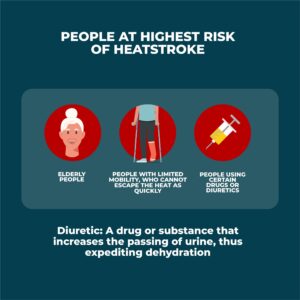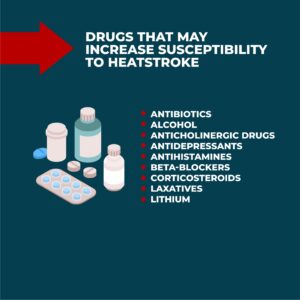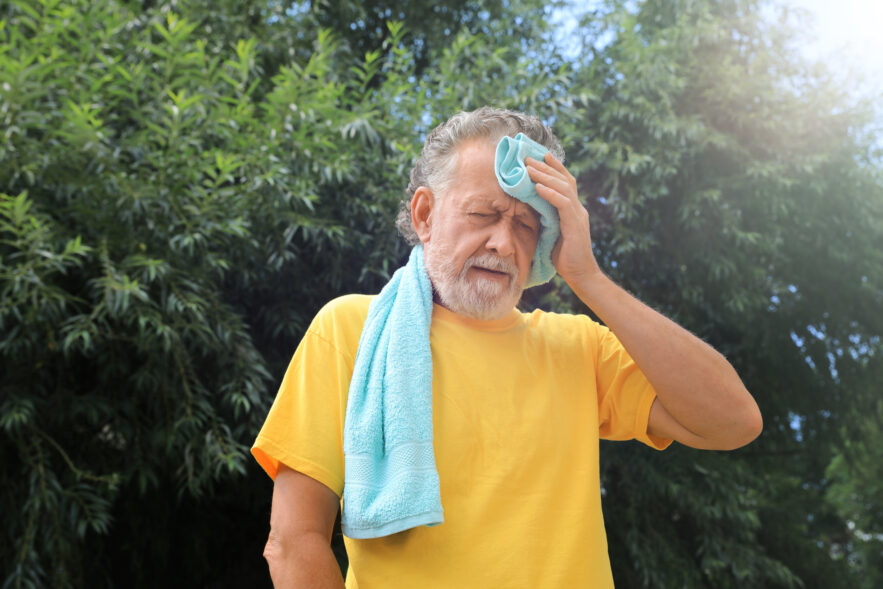Heat Exhaustion & Heatstroke
Yet another heat wave is “baking” the U.S. and is expected to last all week. And this is just the first full week of summer.
In 2022, thousands of people died from heat-related causes in Spain, Portugal United Kingdom, the United States, and India.
Extra-high temperatures are perilous for everyone, but they are even more so for the elderly, people who need electric medical equipment and for those on medications with side effects that can increase their sensitivity to heat. You may need to take extra caution to remain safe when the heat rises.

Heat exhaustion is a risky condition that can precede heatstroke. If you experience heavy sweating, cold or clammy skin, a rapid pulse, weakness, dizziness or headache, you should seek a cooler area and sip water immediately. Taking a cool bath or placing cold cloths on your body may also help.
Heatstroke happens when your body temperature rises above 103 degrees Fahrenheit. Its symptoms are similar to those of heat exhaustion, but are more severe. You may vomit, become confused, alter your speech or lose consciousness. If those symptoms happen, you or someone nearby should call 911 immediately. You should not give the person water, according to the Center for Disease Control and Prevention (CDC)
“If heatstroke does occur, the condition requires emergency treatment. Untreated heatstroke can quickly damage your brain, heart, kidneys and muscles,” says Ailynne Marie Vergara-Wijangco, MD, a dermatologist and researcher. “The damage worsens the longer treatment is delayed.”
Drugs and Dehydration

Some drugs and substances that can act as diuretics, which rid the body of extra fluid and salt, include:
Alcohol
Anticholinergic drugs
Antidepressants
Antihistamines
Beta-blockers
Corticosteroids
Laxatives
Lithium
Other drugs, like antipsychotics, can make it difficult to regulate your body temperature. Both having schizophrenia and taking antipsychotics to treat it can put you at higher risk during excessive heat.

“The main underlying problem with heat exhaustion and heatstroke is fluid loss. As the body gets hotter, it sweats more and fluid is lost,” says David Beatty, MD a general practitioner. Loss of fluid means dehydration. “Diuretics (water tablets), used for hypertension and heart failure, are intended to clear fluid from the body.”
In doing so, diuretics can exacerbate dehydration. John Michael Sefel, a writer and researcher, went to the hospital more than once after experiencing headaches, dizziness and nausea, due to the heat. He only recently learned that the diuretics he’s been prescribed may be putting him at risk.
Drugs that raise blood sugar can also lead to dehydration by causing both the sugar and fluid to leak out of the kidneys.
Anticholinergics which are used to treat a variety of disorders from chronic obstructive pulmonary disease to Alzheimer’s and antihistamines which are usually used to dry up sinuses and limit coughs can also cause problems. Orthopedic surgeon Ong Kee Leong, Bachelor of Medicine, Bachelor of Surgery, (MBBS), explains that they also prevent our bodies from sweating properly to cool off. “And when our body is not at its optimum capacity to sweat and cool itself as it should, the risk of having a heatstroke and exhaustion can strike any time,” he adds.
Beta-blockers reduce blood flow to your skin, says Ong. “And when the skin lacks blood, your body can’t properly discharge heat.”
In addition to beta-blockers, many drugs, such as antidepressants, can lower blood pressure as a side effect.
If you’re worried that your medicines may be putting you at risk of increased heat sensitivity or heatstroke, call your doctor. He or she may suggest decreasing your dose or pausing the use, but you should not stop taking a prescribed medication without talking with your doctor first, as ceasing the medicine abruptly may be harmful to you. “I wouldn’t recommend stopping regular medication without a discussion with your doctor, but it is possible that the need for certain medications may change during extremely hot weather conditions,” says Beatty.
Treatment and Prevention

“If you’re feeling the heat with headache, dizziness, excess sweating, nausea or confusion, then lie down and raise your feet,” says Beatty.
Most importantly, do your best to stay inside during the hottest part of the day. If you do go outside, wear loose-fitting clothing and sunscreen because, aside from being uncomfortable, sunburns reduce your body’s ability to cool itself. Drink water and take breaks often. Avoid alcohol or intense exercise. Use cool, wet cloths, yard sprinklers or baths to cool down.If symptoms worsen, seek immediate medical attention.






